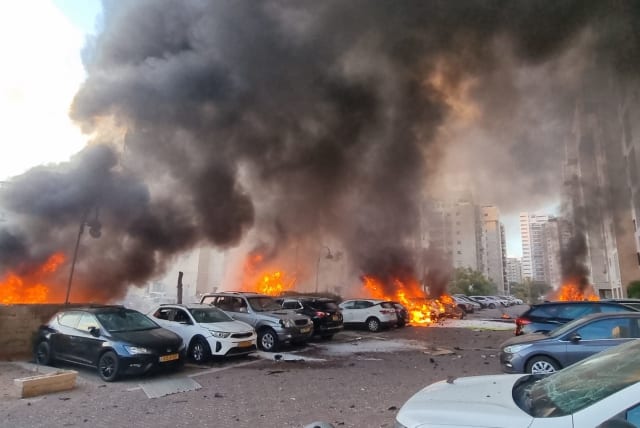Israel is haunted by the ghosts of the Yom Kippur war in this attack - comment

The Yom Kippur War of 1973, exactly 50 years ago today, serves as an important point of reference in understanding the gravity of Israel’s recent oversight.
October 2023 will be another milestone in Israel’s story of defense. While I write this article the fog of war is still dense. The scope of the casualties is unclear, and the number of people kidnapped to Gaza uncertain. Hamas’s bold land, sea and air invasion into Israeli territory paints a grim picture of a nation caught off-guard, a military intelligence failure that’s reminiscent of past strategic surprises like the Yom Kippur War and the 9/11 terrorist attacks.
Combined with an operational failure that did not prevent infiltration into Israel. What is clear, is that Israel’s advanced technology, ironclad defense systems, and some of the best intelligence units in the world, faltered. The repercussions are already severe: tens of soldiers and civilians massacred, hundreds wounded, and thousands under incessant rocket fire.
How did Israel, a nation always on alert, find itself in this precarious position?
The Yom Kippur War of 1973, exactly 50 years ago today, serves as an important point of reference in understanding the gravity of Israel’s recent oversight. Egypt and Syria, launching a coordinated assault during the Jewish holy day of Yom Kippur, caught Israel off-guard. Though Israel ultimately emerged victorious, it was a pyrrhic victory that revealed severe gaps in intelligence and military preparedness. The lesson from 1973 was clear: never underestimate the adversary. Yet, history has a peculiar way of repeating itself.
Similarly, the 9/11 terrorist attacks underscored the perils of complacency. The mightiest nation on Earth, equipped with unparalleled intelligence and defense mechanisms, was blindsided by a series of coordinated airline hijackings, leading to the fall of the Twin Towers and the deaths of thousands. The attack served as a painful lesson about the evolving nature of threats and the dire consequences of underestimating them.
Drawing parallels between the Yom Kippur War, the 9/11 attacks, and the recent Hamas land invasion, there are some common threads: a complacency rooted in a perception of our own invincibility, a failure to adapt to evolving threats, and in my opinion a severe underestimation of Hamas’ capability and resolve; what in Israel is called “the concept”.
The sad reality is that this shouldn’t have been a surprise. In 2014, in the aftermath of Operation Protective Edge, I was interviewed by Vanity Fair. This is an exact quote I gave them then: “Hamas had a plan, a simultaneous, coordinated, surprise attack within Israel. They planned to send 200 terrorists armed to the teeth toward civilian populations. This was going to be a coordinated attack. The concept of operations involved 14 offensive tunnels into Israel. With at least 10 men in each tunnel, they would infiltrate and inflict mass casualties.” They failed then, but this heinous plan was realized this Shabbat, Simchat Torah, morning.
Our society is in a state of shock and disbelief and the government and the defense establishment will have to be held accountable.
Several factors appear to have contributed to Israel’s ill-preparedness:
Perceived Invincibility: Israel’s robust defense system, the Iron Dome, has successfully intercepted countless rockets over the past decade. Combined with a billion dollar barrier built along the 65 kilometer Gaza border, and a perception that Hamas is not interested in war with Israel because of the price the organization and the people of Gaza have paid over the last 10 years. This might have led to a skewed perception of invulnerability even against land-based invasions, overshadowing the need for ground defense preparedness.
Shift in Hamas Tactics: Historically, the threat from Hamas has been asymmetric warfare, with rockets, tunnels, and suicide bombers. The concept of a large-scale land invasion might have been discounted as a viable threat, given Hamas’s resource constraints and Israel’s military superiority.
Intelligence Gaps: Reliable intelligence is Israel’s cornerstone. There might have been lapses or misinterpretations of data regarding Hamas’s intentions or capabilities, echoing the intelligence failures of the Yom Kippur War.Psychological Underestimation: Just as the US failed to imagine terrorists using airplanes as missiles before 9/11, Israel might not have conceptualized a direct, bold, land invasion by Hamas.
Once the dust settles, lessons must be learned in order to prevent future miscalculations. We will need a holistic re-evaluation.
Diversified Defense: While air defense is crucial, ground and cyber defenses should not be neglected. A holistic approach to security is needed.
Adapting to evolving threats: Israel must consistently reassess its threat models, understanding that adversaries can and will adapt their tactics
Enhancing intelligence: Bridging the gaps in intelligence gathering, interpretation, and dissemination is paramount. This might mean investing in more human intelligence on the ground and fostering better communication between agencies.
Lessons from History: Israel should periodically review past mistakes, both its own and others’, ensuring that complacency never sets in again.
Faith in the institutions: In this uber-political time in Israel’s history when the prime minister and his government have conducted a campaign against the faith of the public in all the institutions, the courts, the police, the military and the civil service. It is of paramount importance to embolden the institutions, not weaken them.
The Hamas land invasion is a wakeup call. Terrorist organizations and many in our region have still not come to terms with Israel’s existence. Many of them, like Hamas, are bent on Israel’s destruction. Most of them don’t have the possibility but this war underscores the timeless lesson that no matter how advanced or prepared a nation believes itself to be, there’s always room for improvement, always a blind spot, and always an evolving threat lurking in the shadows. The cost of overlooking these lessons is tragically high.
The writer, a Lt. Col. (res.), is director-general of the International Relations Division of the Histadrut. He is a negotiations, conflict resolution and management expert, communications specialist, and former military spokesperson.
Jerusalem Post Store
`; document.getElementById("linkPremium").innerHTML = cont; var divWithLink = document.getElementById("premium-link"); if (divWithLink !== null && divWithLink !== 'undefined') { divWithLink.style.border = "solid 1px #cb0f3e"; divWithLink.style.textAlign = "center"; divWithLink.style.marginBottom = "15px"; divWithLink.style.marginTop = "15px"; divWithLink.style.width = "100%"; divWithLink.style.backgroundColor = "#122952"; divWithLink.style.color = "#ffffff"; divWithLink.style.lineHeight = "1.5"; } } (function (v, i) { });

